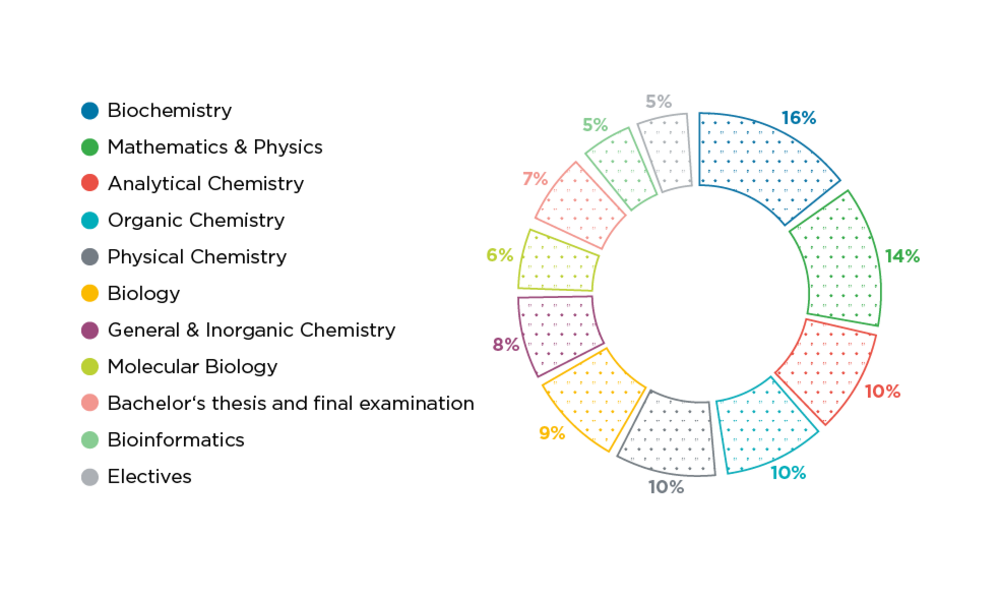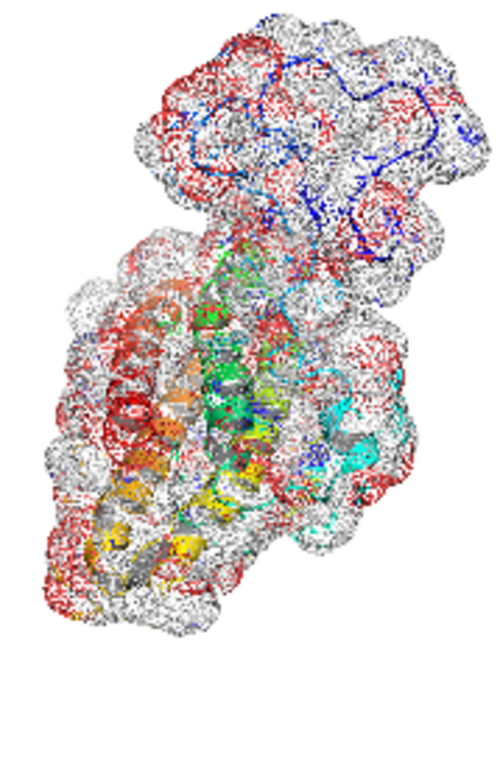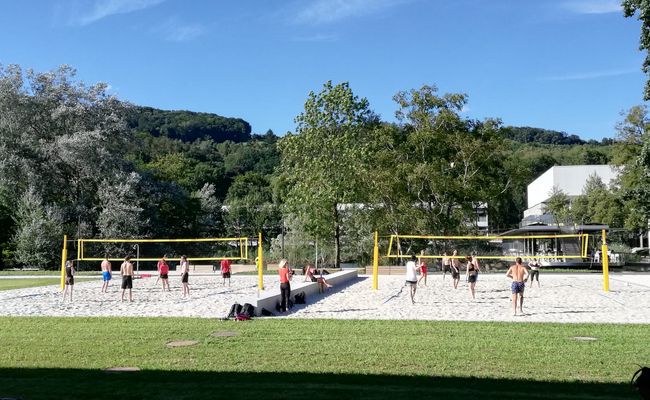A video recording presenting the program during the 2021 JKU Open Days *Online
Duration: 28 minutes
Video on YouTube, opens an external URL in a new window
Can humans being be cloned? What does having a metabolic disorder mean? Biochemistry allows you to explore the building blocks of life. You learn the terminiology used in two major disciplines and work as a solution-oriented facilitator at the interface of biology and chemistry.
Biological Chemistry is a stand-out, multidisciplinary, and transnational academic degree program offered jointly by the Johannes Kepler University Linz (AT) and the University of South Bohemia in České Budějovice (CZ).
Students here focus on a base-knowledge understanding of various types of chemistry in an effort to better understand biological processes. An inherent part of the program includes hands-on laboratory courses as well as a strong focus on chemistry and life sciences. All of the courses in the program are offered in English, giving you an opportunity to hone your language skills and actively take part in a stimulating international environment.
Graduates of the Bachelor's degree program are highly sought-after and in high demand in the job market. Graduates can also opt to pursue a Master's degree in a STEM field.
Page Content
Key Facts
Degree
Dual Bachelor's degrees:
Bachelor of Science (BSc)
Bachelor (Bc)
Duration
6 semesters
Location
Linz and Budweis (CZ)
ECTS
180 credits
Language
English (Level B2)
Program
Full-Time
Why Biological Chemistry Is Particularly Attractive Degree Program
- You spend the first year of the program in Linz, Austria, and the second year in České Budějovice, Czechia, getting better acquainted with two different universities and their individual campus settings and exciting student life.
- The joint Bc. and BSc. degree program gives you a unique opportunity to earn two Bachelor's degrees.
- Your competitive edge in the job market is distinctive as you are able to build bridges and come up with solution-oriented approaches at the crossroads between chemistry and biology.
Program Structure
This program requires studying at two universities and splitting your time between each university. The structure is as follows:
- 1st and 2nd semester: JKU Linz (A)
- 3rd and 4th semester: USB Budweis (CZ);
- 5th semester: JKU Linz (A)
- 6th semester: JKU Linz (A) / USB Budweis (CZ).
As part of the Bachelor’s degree program, students are required to complete courses totaling 180 ECTS credits in the following areas:

Studies Information and Orientation Phase (StEOP)
Newly enrolled students are required to complete the StEOP (= Studieneingangs- und Orientierungsphase) requirements at the start of the Bachelor's degree program. The StEOP courses are outlined in the curriculum. You will be limited in the number of classes you can sign up for until you have successfully passed all of the required StEOP courses. The curriculum is available below under Downloads & Services. Additional information about the Bachelor's degree program in Biological Chemistry is available on the Institute of Organic Chemistry's homepage.
Detailed Information About the Program
If you would like to learn more about the Bachelor's degree program in Biological Chemistry, please refer to the curriculum. In addition, we have summarized some additional information separately.
Areas of Specialization in the Bachelor's Degree Program Biological Chemistry
The undergraduate degree program in Biological Chemistry focuses on the following:
- Chemistry: General, organic, inorganic, analytical, and physical chemistry - during class and as part of labs, you will strengthen your base-knowledge understanding in different types of chemistry.
- Mathematics and Physics: You will learn about the required mathematical and physical concepts needed for any STEM major, such as differentiation, integration, statistics, Fourier transforms, series expansion, linear algebra, main theorems of thermodynamics, mechanics, and quantum mechanics.
- Bioinformatics: How do you analyze biological data? Learn more about the foundations of phylogenetics and sequence analysis.
- Biochemistry: You will dive deep into learning about our body's chemical processes to learn more about the building blocks of life.
- Molecular Biology: Starting with DNA to RNA to protein: How are biological molecules structured? How do they synthesize? How do they interact with each other)
 3D Struktur PsbQ-Protein (Spinacia oleracea)
© Rathner/JKU: 3D structure of PSbQ protein
3D Struktur PsbQ-Protein (Spinacia oleracea)
© Rathner/JKU: 3D structure of PSbQ protein
Study for a Day
Are you interested in one of our academic degree programs? Visit our JKU campus and hang out with a JKU student. You can attend a class and get first-hand information about studying at the JKU. Click here for sign up.
What You Will Learn at the University
You will learn to work across disciplines and in a solution-oriented capacity, acquiring these key skills and expertise:
- How to Work Safely in a Lab: Conduct lab activities focusing on chemistry and biology
- Analytical Techniques: Antibody testing, chromatography, electrophoresis, calorimetry, mass spectrometry, patch clamp methodology, PCR, protein sequencing
- Structural Analysis: DNA and RNA sequencing, fluorescence microscopy, confocal microscopy, molecular dynamics simulation, NMR spectroscopy, Raman spectroscopy, X-ray crystallography
- Preparative Techniques: CRISPR-Cas9 (gene scissors), cloning, organic synthesis, recombinant protein expression, ultracentrifugation
- Social Skills: The Bachelor's degree program includes learning how to work effectively as part of an interdisciplinary team in order to be able to communicate findings to a wider audience and/or write an academic paper. Successful researchers are expected to demonstrate a strong social skill set.
Did you know that ...?
...the small fruit fly (Drosophila melanogaster) has been the source of 5 Nobel Prizes? This particular fruit fly's genome is actually quite similar to our genome so over the past 100 years, this fruit fly has been used as a model organism.
Video about the program
Career Prospects
Graduates of the Bachelor's degree program in Biological Chemistry are qualified to pursue an internationally-oriented, professional career in the following areas:
- You are responsible for performing various analyses in both medical and research laboratories (PCR, HPLC, electrophoresis)
- Production and quality control at biotechnology and chemical companies, for example in support of drug development, pharmaceuticals, biopolymers, cosmetics, natural products, chemical fibers, etc.. You can take on a variety of tasks and responsibilities, be it conducting experiments in support of research and development, or carrying out analyses in support of quality and safety control.
- At organizations, agencies and government authorities, including environmental, occupational and consumer protection and licensing agencies, in support of chemical and biological products and/or processes. You could, for example, be responsible for reviewing safety data and information for new drugs and/or biological/chemical processes.
Many graduates also opt to continue on in their studies and pursue a graduate degree!
![[Translate to Englisch:] Marco Halbeisen Biological Chemistry Bachelorstudent 2021](/fileadmin/_processed_/d/4/csm_marco-halbeisen-bachelor-biological-chemisty-student-2021-jkulinz_c3aeb38882.jpg)
Register to Enroll
Students can begin the Bachelor’s degree program in Biological Chemistry either at the start of the Winter Semester or the Summer Semester. We recommend, however, beginning at the start of the Winter Semester as there could otherwise be delays in successfully completing the program in 6 semesters.
Requirements
In order to be admitted to the Bachelor's degree program, you must fulfill the following requirements.
- Hold general higher education entrance qualifications (such as an Austrian "Matura" or German "Abitur" diploma)
- Proof of language proficiency in English (Level B2)
Still have questions?
Then contact us!
Department
Admissions Office
Building
Frequently Asked Questions
No, you don't have to commute between both universities; you will spend an academic year at each respective university. The first year of the program is at the JKU in Linz, Austria, and the second academic year is at USB in České Budějovice, Czechia. The fifth semester is at the JKU again, and your time during the sixth semester is spent divided between both universities (writing the Bachelor's thesis, studying for the final exam).
You register to enroll at JKU. At the beginning of the semester you will be contacted by the Department of Student Affairs at USB and receive all necessary information.
You can choose between student housing (directly on campus), private housing (also on campus), or private shared housing (students usually have several options near the university).
Once you successfully finish the program, you will be awarded two Bachelor degrees: a Bakalar (Bc.) and a Bachelor of Science (BSc.).
The program requires completing two hands-on theses: a more "biologically oriented" thesis at USB (which is to be written during the second year. It can take up to a year to write the thesis depending on the topic but it is not too difficult to combine it with presentations). The final Bachelor's thesis at the JKU focuses more on chemistry and can be completed in approximately 3-4 weeks.
See the curriculum, opens an external URL in a new window for detailed information about the required courses, subject areas, and when you should take these courses. Additional information about the subject areas (prerequisites, ECTS credits, etc.) is available in the online course catalog, opens an external URL in a new window.
Still Have Questions?
Do you need help registering or do you have questions about the program? Contact the JKU's Office of Student Information and Academic Advising (SIBS)!
STAY UP-TO-DATE
... and sign up to receive the JKU Newsletter for prospective students! Everything you need to know about studying at the JKU, upcoming events. and what's new.
Advanced Degree Programs
After completing your undergraduate degree, you can continue your education by pursuing an advanced degree:
Similiar Degree Programs
You may also find these degree programs interesting:
-
All Bachelor's and Diploma Degree Programs
Overview




